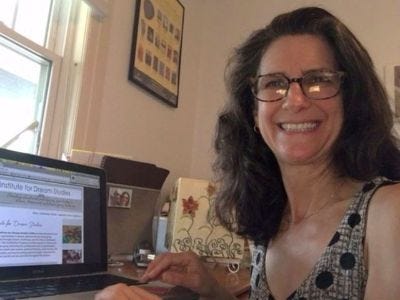Piecing it together
The fragmentary nature of telling the story of a biblical woman, a poetic backstory, and inspirational words for Passover

Welcome! The Life of H: Sarah, Reimagined is a serialized book-in-process tucked into a weekly newsletter. Here you’ll find poems and lyrical prose inspired by the life of the biblical matriarch, Sarah. To ensure you don’t miss out, subscribe. (It’s free! Or, you can choose a paid subscription to support this project — and to receive access to exclusive content.)
Each weekly installment stands on its own. But it’s best to get the full experience. To start at the beginning, click here.
A story told in fragments
As I write The Life of H: Sarah, Reimagined an entire backstory unwinds in my imagination:
I see Sarah as an infant and as a child. I see her come into maturity, and I see her fall in love. I follow her as she crosses the desert and through her doubts and determination, all the way to her death.
So, why not write The Life of H as a novel – or even a YA book, my friends ask?
Why, of all things, poetry?
Here’s why:
Because after years of reading and researching Sarah’s story, I don’t have anything like a complete biography. I don’t even have a singular plotline.
Sarah shifts in my imagination. I see her as a priestess empowered and ensconced in a community of other priestesses. And she is a wife and eventually a mother. She embraces monotheism and she is devoted to the traditions of her foremothers. But she is also a groundbreaker. She stands up to God and she stands up to her husband. But she assents to being handed over to a king and a pharaoh.
Does she submit or rebel? Was she an obedient beauty? A badass? She laughs a lot, but she is also fierce, and sometimes cruel.
I have only a handful of fragments, like the clay shards from the broken statues that littered the floor of Terah’s1 workshop after a young Abraham — newly converted to the idea of monotheism — knocked his father’s idols off their shelves.
I sift through the broken pieces. They change color when they catch the light and are layered in shadow when they do not. What to do with all these fragments?
The Bible is also a fragmented text. Its stories were passed from mouth to ear for generations before they were finally put down on — well, if not paper, perhaps papyrus or animal hides. They were scribed by many hands each with a different perspective and bias. Some details were preserved; others were left out and lost. There is as much information between the lines as on them.
Like a vase that is pieced back together after shattering to the ground, there are cracks and empty spaces in this story where the light of curiosity and questioning can shine through.
Poetry is an art form that is in love with fragments. In a poem lines of print dance with white space. What is said, bows to what is unsaid. Silence and speech are devoted partners.
I stand before the page carrying armfuls of emptiness and thimblefuls of certainty. And I know that only poetry can hold all of those unknowns and silences and make them sing.
[1] Terah, Abraham’s father, is mentioned briefly in Genesis. More of his story is revealed in rabbinic literature, which posits that Terah was an idol-maker and as a young man, Abraham might have assisted him. Later, as his belief in monotheism evolved, Abraham is said to have smashed the statues of gods and goddesses in Terah’s workshop.
Today’s poem is, “You, By Her Side.” In this poem, I dream into Sarah’s backstory. Press the blue arrow below to listen.
Copyright Tzivia Gover and Third House Moon, LLC. All rights reserved.
UPDATE: A revised version of this poem was published in The Jewish Poets Collective Journal. Read it here to discover how the poem has evolved.
‘The Life of H’ is a FREE newsletter. To offer a little extra love and to support this project, consider a paid subscription! PLUS, if you purchase a paid subscription now, you’ll get 20% off:
I’m so pleased to be taking this poetic journey with you! Thank you for your curiosity, your interest, and your support.
Tzivia Gover is the author of seven nonfiction books. Her poems appear in dozens of anthologies, journals, and periodicals.
Copyright Tzivia Gover and Third House Moon, LLC. All rights reserved.
Terah, Abraham’s father, is mentioned briefly in Genesis. More of his story is revealed in rabbinic literature, which posits that Terah was an idol-maker and as a young man, Abraham might have assisted him. Later, as his belief in monotheism evolved, Abraham is said to have smashed the statues of gods and goddesses in Terah’s workshop.





